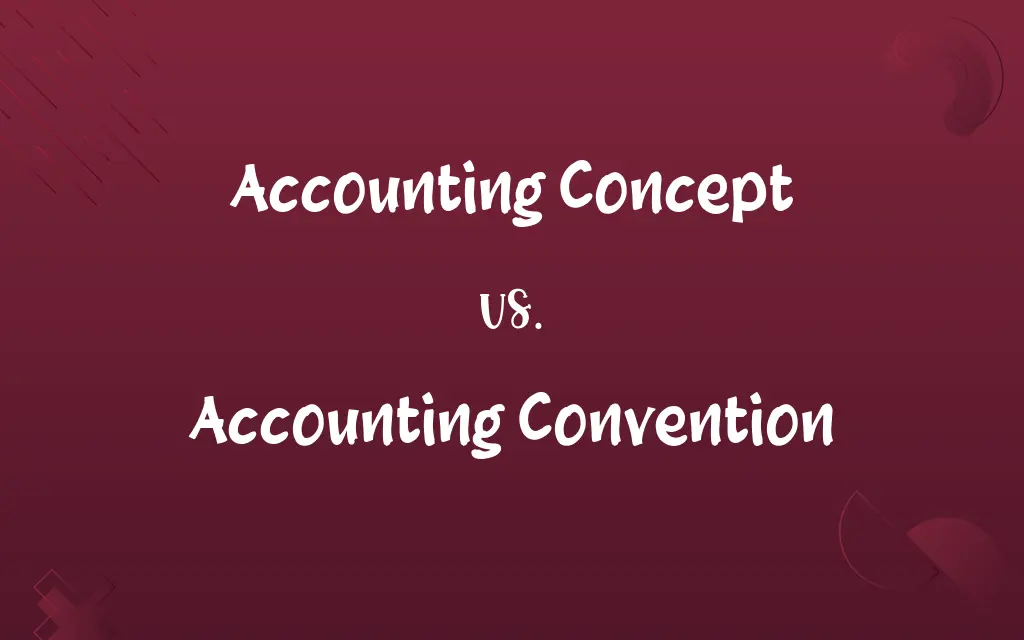Accounting Concept vs. Accounting Convention: Know the Difference

By Shumaila Saeed || Published on January 30, 2024
Accounting Concepts are fundamental principles guiding financial reporting, while Accounting Conventions are accepted practices developed over time.

Key Differences
Accounting Concepts are the basic assumptions or conditions upon which the science of accounting is based, such as the going concern concept, which assumes a business will continue to operate indefinitely. In contrast, Accounting Conventions are the customs or traditions that guide the preparation of financial statements, like the conservatism principle, where accountants report expenses and liabilities as soon as possible, but revenues only when they are certain.
Shumaila Saeed
Jan 30, 2024
The essence of an Accounting Concept lies in its theoretical foundation, forming the bedrock of accounting practices, such as the accrual concept which recognizes transactions when they occur regardless of cash flow. On the other hand, Accounting Conventions focus on the practical aspects, offering a framework for addressing accounting scenarios, exemplified by the materiality convention that disregards trivial financial information for practical purposes.
Shumaila Saeed
Jan 30, 2024
Accounting Concepts are generally universal and provide a theoretical framework for financial reporting, like the consistency concept ensuring that financial statements are comparable across periods. Conversely, Accounting Conventions are more flexible and adaptable, reflecting the evolving nature of business practices, as seen in the historical cost convention, where assets are recorded based on their original cost.
Shumaila Saeed
Jan 30, 2024
While Accounting Concepts serve as the foundational doctrines shaping the discipline, such as the matching concept which aligns expenses with associated revenues, Accounting Conventions are more about the application of these principles in real-world scenarios, like the full disclosure convention requiring all relevant financial information to be disclosed in financial statements.
Shumaila Saeed
Jan 30, 2024
Accounting Concepts represent the theoretical aspects of financial accounting, like the entity concept which treats a business as separate from its owners. In contrast, Accounting Conventions are the customary methodologies applied in financial reporting, illustrated by the prudence convention, emphasizing caution in financial reporting and decision-making.
Shumaila Saeed
Jan 30, 2024
ADVERTISEMENT
Comparison Chart
ADVERTISEMENT
Accounting Concept and Accounting Convention Definitions
Accounting Concept
Accounting Concepts guide the preparation and presentation of financial statements.
The going concern concept assumes a business will continue operating, affecting its asset valuation.
Shumaila Saeed
Jan 09, 2024
Accounting Convention
Accounting Conventions evolve with changes in business practices.
The historical cost convention records assets at their original cost, reflecting past market conditions.
Shumaila Saeed
Jan 09, 2024
Accounting Concept
Accounting Concepts are fundamental principles that underpin financial reporting.
The accrual concept ensures revenues and expenses are recorded when they occur, not when cash is exchanged.
Shumaila Saeed
Jan 09, 2024
Accounting Convention
Accounting Conventions balance between theoretical accuracy and practical feasibility.
The prudence convention ensures that liabilities and losses are recorded promptly.
Shumaila Saeed
Jan 09, 2024
Accounting Concept
They provide a theoretical framework for accounting procedures.
The consistency concept maintains uniform accounting methods over time for comparability.
Shumaila Saeed
Jan 09, 2024
ADVERTISEMENT
Accounting Convention
They represent the practical application of accounting principles.
The materiality convention allows minor errors to go uncorrected if they don’t impact decisions.
Shumaila Saeed
Jan 09, 2024
Accounting Concept
These concepts form the basis of accounting standards and rules.
The matching concept dictates that expenses be matched with revenues in the same period.
Shumaila Saeed
Jan 09, 2024
Accounting Convention
These conventions aid in the interpretation and application of accounting rules.
The full disclosure convention requires all relevant financial information to be presented.
Shumaila Saeed
Jan 09, 2024
Accounting Concept
Accounting Concepts ensure the reliability and relevance of financial information.
The entity concept separates personal and business transactions, enhancing financial clarity.
Shumaila Saeed
Jan 09, 2024
Accounting Convention
Accounting Conventions are customary practices in financial reporting.
The conservatism convention leads to reporting lower profits to avoid overstating financial health.
Shumaila Saeed
Jan 09, 2024
Repeatedly Asked Queries
What are Accounting Concepts?
Fundamental principles that guide financial reporting.
Shumaila Saeed
Jan 30, 2024
How do Accounting Concepts affect financial statements?
They ensure consistency, reliability, and comparability of financial data.
Shumaila Saeed
Jan 30, 2024
Can Accounting Concepts change over time?
They are relatively stable but can evolve with changes in the accounting industry.
Shumaila Saeed
Jan 30, 2024
What are Accounting Conventions?
Customary practices that guide the application of accounting principles.
Shumaila Saeed
Jan 30, 2024
Can Accounting Conventions vary by region?
Yes, they can vary based on local business practices and regulations.
Shumaila Saeed
Jan 30, 2024
Do Accounting Conventions impact financial decision-making?
Yes, they influence how financial information is interpreted and used.
Shumaila Saeed
Jan 30, 2024
What is an example of an Accounting Concept?
The accrual concept, recognizing transactions when they occur.
Shumaila Saeed
Jan 30, 2024
Is it necessary to follow both Accounting Concepts and Conventions?
Yes, for accurate and standardized financial reporting.
Shumaila Saeed
Jan 30, 2024
Can there be conflicts between Accounting Concepts and Conventions?
Occasionally, due to differences in theoretical and practical approaches.
Shumaila Saeed
Jan 30, 2024
Are Accounting Concepts universally accepted?
Yes, they are widely accepted and form the basis of accounting standards.
Shumaila Saeed
Jan 30, 2024
Why are Accounting Conventions important?
They provide practical guidance for preparing financial statements.
Shumaila Saeed
Jan 30, 2024
Do Accounting Concepts apply to all types of businesses?
Generally, yes, they are applicable across various business types.
Shumaila Saeed
Jan 30, 2024
How do Accounting Conventions differ from Accounting Concepts?
Conventions are more about practical application and adaptability.
Shumaila Saeed
Jan 30, 2024
Are there international standards for Accounting Concepts?
Yes, like the International Financial Reporting Standards (IFRS).
Shumaila Saeed
Jan 30, 2024
How often do Accounting Conventions change?
They evolve with changes in business practices and economic environments.
Shumaila Saeed
Jan 30, 2024
Can a company disregard Accounting Conventions?
Disregarding them can lead to inaccurate or misleading financial statements.
Shumaila Saeed
Jan 30, 2024
Are Accounting Concepts legally binding?
They are not laws, but non-adherence can lead to misleading financial reports.
Shumaila Saeed
Jan 30, 2024
How do new accountants learn about these Concepts and Conventions?
Through formal education and practical experience in accounting.
Shumaila Saeed
Jan 30, 2024
What is the role of technology in applying Accounting Concepts and Conventions?
Technology aids in the consistent application and analysis of these principles and practices.
Shumaila Saeed
Jan 30, 2024
Do Accounting Conventions have legal status?
They are not legal requirements but are essential for sound financial practices.
Shumaila Saeed
Jan 30, 2024
Share this page
Link for your blog / website
HTML
Link to share via messenger
About Author
Written by
Shumaila SaeedShumaila Saeed, an expert content creator with 6 years of experience, specializes in distilling complex topics into easily digestible comparisons, shining a light on the nuances that both inform and educate readers with clarity and accuracy.








































































